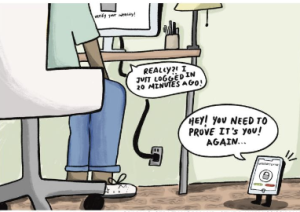
On the first day of school, Ole Miss’ technical support office, the IT Helpdesk, found itself swarmed with inquiries from confused students. Thanks to a recent university-wide switch from Google to Microsoft applications, students found themselves unable to log into Blackboard, the learning tool that is crucial for classwork.
The source of these difficulties was Microsoft’s Authenticator, a free app that stores account credentials and provides a secure way to verify your identity when logging onto a given program.
As ransomware attacks against universities have risen in frequency, implementing security measures like Microsoft’s Authenticator is meant to prevent such a scenario happening at the University of Mississippi.
Nishanth Rodrigues, chief information officer for the Technology Information Department, explained that the department and UM officials decided to implement a pre-authentication measure earlier this year.
“One of the reasons we had to put this in place is to better protect all of our services on campus,” Rodrigues said.
Microsoft Authenticator was designed to be a secure, password-less way to prove your identity when logging into certain programs like Box or Blackboard.
Rodrigues also explained how vital it was for UM to switch over to Microsoft software to prevent future campus wide-problems.
“If Google updates their system the whole campus could shut down,” Rodrigues said. “We don’t get updates when they are making changes like we do with Microsoft.”
Although the Authenticator app provides a new level of safety for students and faculty, some have had issues with its implementation.
Jasalyn McNamara, a junior business major, reported that she had trouble logging into Blackboard on the first day of class. Her laptop was in the process of being fixed, so using her phone only complicated the situation.
“In class, we needed the material in front of us due to the projector not working,” McNamara said. “At the end of class, we had to take a quiz over the syllabus. Unfortunately, I had no way of accessing it.”
Although setting up the Authenticator app has been a common struggle in the campus community, the UM Helpdesk has worked to fix issues for anyone who comes in.
McNamara and her friend, who had the same issue with Authenticator, visited the UM Helpdesk to resolve their tech problems.
“The UM Helpdesk was very accommodating,” McNamara said. “I was in and out within 15 minutes. They said they had many people come in with the same issue, so at the time when I had come in, they were able to move quickly.”
McNamara explained that she has gotten used to the process of logging into her account, but it still frustrates her and her professors.
“Since then, I haven’t had any problems with the authentication, but I don’t like using it every time I access my Blackboard,” McNamara said. “It seems like my professors have a dislike towards it too.”
Junior psychology major Maris Thompson expressed similar frustrations over the two-step process.
“The two-step authentication process to log in to Blackboard has been extremely frustrating because the process of completing work is slowed down each time a student has to sign in,” Thompson said. “I have also met many students who struggled with the app and weren’t able to see their assignments, schedule, etc. because of it.”
Senior Chinese and computer science major Jacob Raby echoed that the Authenticator app makes school work more tedious.
“I think two-factor authentication is a smart idea in general, but I think the Microsoft Authenticator app has been inconsistent for when it is required, especially when our school account is linked to so much software,” Raby said. “This means I need to use my phone multiple times during class to access any resources. I have also seen teachers struggle with using resources in class because they don’t have their phone with them.”
Raby further commented on how the Microsoft Authenticator app is unfair to students without a working smartphone.
“I also think it is unfair for students who don’t have phones or phones are broken to be unable to access Blackboard,” Raby said.
Since the first week of classes, the UM Helpdesk has not seen a decrease in issues with the app. UM Helpdesk employee Jonathan Rickles explained that workers are still fairly busy fixing tech problems with Microsoft Authenticator.
“There has been a decrease since the first day, but I wouldn’t say it has been drastic,” Rickles said.
Although most of the issues are related to set-up and connection of the app, Rickles reiterated that the UM Helpdesk is available for anyone who needs them.
“The setup process is confusing, come by if you need help. Emails are accepted too,” he said.
Hal Fox contributed reporting.


























